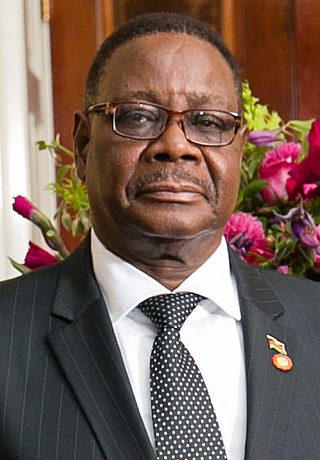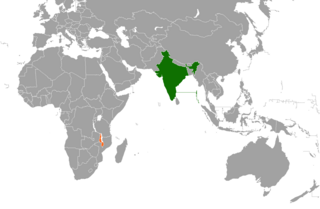Related Research Articles

Bingu wa Mutharika was a Malawian politician and economist who was President of Malawi from May 2004 until his death in April 2012. He was also President of the Democratic Progressive Party, which he founded in February 2005; it obtained a majority in Malawi's parliament in the 2009 general election.

The Democratic Progressive Party (DPP) is a political party in Malawi. The party was formed in February 2005 by Malawian President Bingu wa Mutharika after a dispute with the United Democratic Front (UDF), which was led by his predecessor, Bakili Muluzi.

George T. Chaponda is a Malawian career diplomat and politician who served as Malawi's Minister of Agriculture, Irrigation and Water Development from 2016 to 2017. He is a founding member of the ruling Democratic Progressive Party (DPP) and is a DPP Member of Parliament from Mulanje district in southern Malawi.

Joyce Hilda Banda is a Malawian politician, who served as President of Malawi, from 7 April 2012 to 31 May 2014. Banda took office as President following the sudden death of President Bingu wa Mutharika. She is the founder and leader of the People's Party, created in 2011. An educator and grassroots women's rights activist, she was the Minister of Foreign Affairs from 2006 to 2009 and the Vice-President of Malawi from May 2009 to April 2012. She has served in various roles as a member of Parliament and as Minister of Gender and Child Welfare before she became the President of the Republic of Malawi.
Billy Abner Mayaya is a Malawian human rights activist, artist, poet and theologian.

The history of human rights in Malawi during recent decades is complicated, and the situation at present is in a state of dramatic, and positive, transition.

Arthur Peter Mutharika is a Malawian politician and lawyer who was President of Malawi from May 2014 to June 2020. Mutharika has worked in the field of international justice, specialising in international economic law, international law and comparative constitutional law. He informally served as an adviser to his older brother, President Bingu wa Mutharika, on issues of foreign and domestic policy from the onset of his election campaign until the President's death on 5 April 2012.
Nyasa Times is an online newspaper providing Malawian news, founded by Edgar Chibaka in 2006. It began reporting in late 2006. According to its own website, it received "over 8 million hits per month" in 2010.
In Malawi a system of Traditional Courts has been used for much of the twentieth century to mediate civil disputes and to prosecute crimes, although for much of the colonial period, their criminal jurisdiction was limited. From 1970, Regional Traditional Courts were created and given jurisdiction over virtually all criminal trials involving Africans of Malawian descent, and any appeals were directed to a National Traditional Court of Appeal rather than the Malawi High Court and from there to the Supreme Court of Appeal, as had been the case with the Local Courts before 1970.
Anthony D. Kamanga is a lawyer who has held various senior official positions in Malawi, and as of 6 December 2012 is the Attorney General of Malawi.
Capital Radio Malawi is a radio station in Malawi that was launched on 29 March 1999 by journalist Alaudin Osman. The station broadcasts across all three regions of Malawi, and covers the urban centers of Blantyre, Zomba, Lilongwe, Dedza Mangochi and Mzuzu. Programming follows an Adult Contemporary format, including various musical genres, news, information and entertainment. The bulk of content is news, business, music and entertainment programming.
Professor Peter Nelson Mwanza is a Malawian politician. He was appointed Minister of Lands, Housing and Urban Development in the government of President Bingu wa Mutharika of Malawi on 17 June 2009. He was reassigned to become Minister of Agriculture and Food Security in a cabinet reshuffle on 9 August 2010.
The 2011 Malawi protests were protests aimed at winning political and economic reforms or concessions from the government of Malawi. On 20 July, Malawian organisations protested against perceived poor economic management and poor governance by President Bingu wa Mutharika and his Democratic Progressive Party. After the first two days of protests, 18 deaths, 98 serious injuries and 275 arrests had been reported. Further demonstrations were organised on 17 August and 21 September The first protest was later cancelled due to the intervention of a UN representative in initiating a dialogue; however, the talks broke down with more protests planned for Red Wednesday through a national vigil.
Robert Chasowa was a University of Malawi engineering student and political activist. Chasowa was the chair of a student activist group, Youth for Democracy (YFD). The YFD printed a weekly pro-democracy and anti-Bingu wa Mutharika administration newsletter called the Weekly Political Update that has circulation around the UNIMA campus. His mysterious death made international headlines but was ruled a suicide under the Bingu wa Mutharika administration. In October 2012, the results of a commission of inquiry led by President Joyce Banda's administration ruled his death as a murder.
Jessie Kabwila-Kapasula is a Malawian academic, feminist, educator and activist. Her scholarship focuses on African feminism.
Malawian diaspora refers to Malawian citizens and foreign nationals of Malawian descent who relocate—temporarily or permanently—to foreign countries. There are no reliable figures on how many Malawians live abroad. Populations of Malawians can be found in the Americas, Europe, Africa and Asia. Malawians have historically been an important supply of both skilled and unskilled labor to other countries. Malawians were a source of labor to the diamond and gold mines in Southern Africa, particularly South Africa. Many Malawian health professionals have migrated to the Global North in search of employment. The migration of skilled labor has contributed to the brain drain that is affecting many African nations.
The 2012 Malawian constitutional crisis occurred from April 5, 2012 - April 7, 2012 after senior members of the Democratic Progressive Party-led cabinet failed to notify the public of the death of the sitting president, Bingu wa Mutharika on April 5. Instead, cabinet ministers held a series of meetings in Lilongwe, Malawi without vice-president Joyce Banda with the aim of undermining the constitution and Banda's succession to Presidency. News confirming his death had, however, quickly spread across the country through word of mouth, cellphone text messages, Malawian bloggers, Twitter, Facebook, and on listservs by the end of the day on April 5, 2012. Therefore, the failure to announce his death resulted in speculation over the real health of the president and over whether the succession procedures would be followed as outlined in the constitution. According to the constitution, the vice-president takes over but there had been no official word on a successor or communication with the vice-president. Amidst growing speculation, the Cabinet announced that the president's brother, Peter Mutharika, the foreign minister, was the new President of the party on April 6. The Cabinet only announced his death two days after his death, after which Banda became Malawi's first female President.
Raphael "Ralph" Tenthani was a freelance journalist from Malawi. Tenthani was a BBC correspondent and a columnist for The Sunday Times. He was a respected journalist in Malawi well known for his popular column, "The Muckraking". He was well known for providing political analysis on topical issues. He had been the subject of controversy for his candid reporting on political issues. He was very critical of the crackdown on journalism during the Bingu wa Mutharika administration. He was also a columnist for Associated Press, Pan African News Agency, and the Maravi Post.

India–Malawi relations refers to the international relations that exist between India and Malawi.
Daliso Chaponda is a Zambian-born Malawian stand-up comedian living in England. In 2017, he became a finalist in the variety show Britain's Got Talent, finishing third overall. In 2018, he launched a BBC Radio 4 series Daliso Chaponda: Citizen of Nowhere.
References
- 1 2 3 4 5 6 Joe Chibewa (4 February 2011). "Chaponda: Oops I goofed, you can fart!". Marevi Post. Archived from the original on 14 July 2011. Retrieved 2 March 2011.
- 1 2 3 4 "Malawi row over whether new law bans farting". BBC News. 4 February 2011.
- 1 2 3 "Malawi media aping the West – government journalist | the Malawi Democrat". Archived from the original on 28 January 2013. Retrieved 12 December 2012.
- 1 2 3 "Malawi row over whether new law bans farting". BBC. 4 February 2011. Archived from the original on 1 March 2011. Retrieved 2 March 2011.
- ↑ KABELO MARUPI (26 January 2011). "Malawi bill seeks to punish public farting and fortune tellers". Afrik News. Retrieved 2 March 2011.
- ↑ "Malawi to debate public farting ban". AFP. 4 February 2011. Archived from the original on 24 January 2013. Retrieved 2 March 2011.
- ↑ "Malawi to debate public farting ban". ABS-CBN News. 2 April 2011. Archived from the original on 20 February 2011. Retrieved 2 March 2011.
- ↑ Wong, Curtis M. (2 April 2011). "Malawi Government Proposes Fart Ban". Huffington Post. Archived from the original on 9 February 2011. Retrieved 2 March 2011.
- ↑ "Malawi To Make Farting in Public Illegal". Reuters. 2 February 2011. Archived from the original on 19 February 2011. Retrieved 1 March 2011.
- ↑ "Malawi 'farting crime' makes British headlines". Nyasa Times. 30 January 2011. Retrieved 2 March 2011.
- ↑ Lester Haines (4 February 2011). "Big stink over Malawi farting ban: Solicitor general challenges trouser cough clampdown". The Register. Archived from the original on 7 February 2011. Retrieved 2 March 2011.
- ↑ "Africa Without Maps".